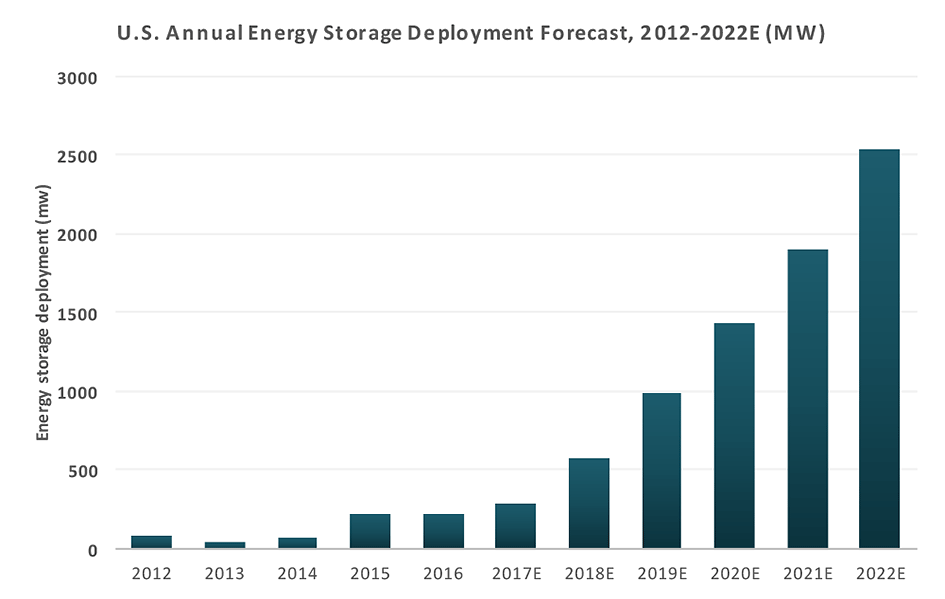The Solar Energy Trifecta: Solar + Storage + Net Metering
Feb. 12, 2018 by Benjamin Mow
Massachusetts recently opened an inquiry focused on the eligibility of energy storage systems to be paired with net metering, and may become the first state to provide comprehensive guidance on the issue. The inquiry is a result of a petition filed by Tesla, Inc. in May 2017 to the Massachusetts Department of Public Utilities (DPU) seeking an advisory ruling on the eligibility of pairing solar-plus-storage systems with current net metering policies. Integrating solar-plus-storage with net metering would allow customers to import and export electricity from the electric grid (as defined by state net metering policy) as well as store energy on-site using a battery. Pairing solar-plus-storage with net metering has received minimal policy attention to-date because energy storage has, until recently, seen limited deployment (see Figure 1). While this policy question may seem obscure, it is starting to pop up in other states as pairing energy storage with solar energy systems becomes more economical.

Figure 1: U.S. Annual Energy Storage Deployment Forecast, 2012-2022E (MW). Adapted from GTM Research.
Net metering paired with energy storage may seem at odds with each other, as net metering can lower the economic value of energy storage for solar customers, particularly in states that offer retail rate net metering. In such a scenario, many customers see little motivation to install an on-site energy storage system. However, in states with time-of-use (TOU) rates, demand charges or net metering compensation rates below retail rates, energy storage systems have the potential to save customers money, allowing distributed PV system owners to store electricity during times of abundant solar generation and withdraw it from the storage system when grid electricity rates are higher. Solar PV system owners could potentially consume electricity from the grid during periods when solar production does not meet demand and/or electricity rates are low.
Tesla’s petition stemmed from an email they received from National Grid, an investor-owned utility in Massachusetts, stating that they did not believe battery storage is eligible for net metering. On September 21st, 2017 the DPU released an advisory ruling that the solar-plus-storage system presented by Tesla qualifies for net metering, but that net metering does not yet broadly apply to all solar-plus-storage applications, stating that the general eligibility of solar-plus-storage systems “requires further investigation.”
At the core of the emerging dialogue around pairing solar-plus-storage with net metering is how to make the combination fair for all parties involved. For example, under TOU rates, PV system owners could potentially charge their on-site battery with electricity from the utility grid when rates are low, and then sell back the power when rates are high. To address this possibility, Tesla and the DPU agreed on three criteria for solar-plus-storage net metering eligibility:
- the solar net metering facility must have a nameplate capacity of 60 kW (AC) or less,
- the battery will be charged only from the solar net metered facility, and
- the battery storage component will not export power to the grid.
The DPU inquiry regarding pairing energy storage with net metering is ongoing, with the DPU seeking written comments through February 2018. The issues raised by Tesla offer only a single example related to this broader question.
Several other states, including Colorado and Rhode Island, have been considering policy related to solar-plus-storage combined with net metering. As part of a much larger docket, the Colorado Public Utilities Commission (CPUC) declared the following:
The Company [Public Service Company of Colorado] will allow an energy storage system that is paired with net energy metering (“NEM”) eligible onsite renewable generation to be operated in parallel with the grid provided that (a) an interconnection review is completed, and either (b) the storage system is charged exclusively by the NEM eligible on-site generation, or (c) the customer can demonstrate the storage system will never export to the grid.
Similar to the issue in Massachusetts, Tesla has also filed a petition with the Rhode Island Public Utilities Commission (PUC) with respect to the eligibility of pairing solar-plus-storage with net metering. The Rhode Island PUC ruled on December 22nd, 2017, that “solar power generating systems no greater than 25 kW AC, and paired with battery storage, where the battery is only charged from the solar power generation system, and the host is not on time-of-use rates, fall within the definition of an eligible net metering system.”
With the cost of energy storage declining and many states moving towards non-retail rate net metering (often called net billing), expect policy developments to continue regarding the pairing of solar-plus-storage with net metering.
For information about solar technical assistance, visit https://www.nrel.gov/state-local-tribal/states.html or email stat@nrel.gov.
Share

